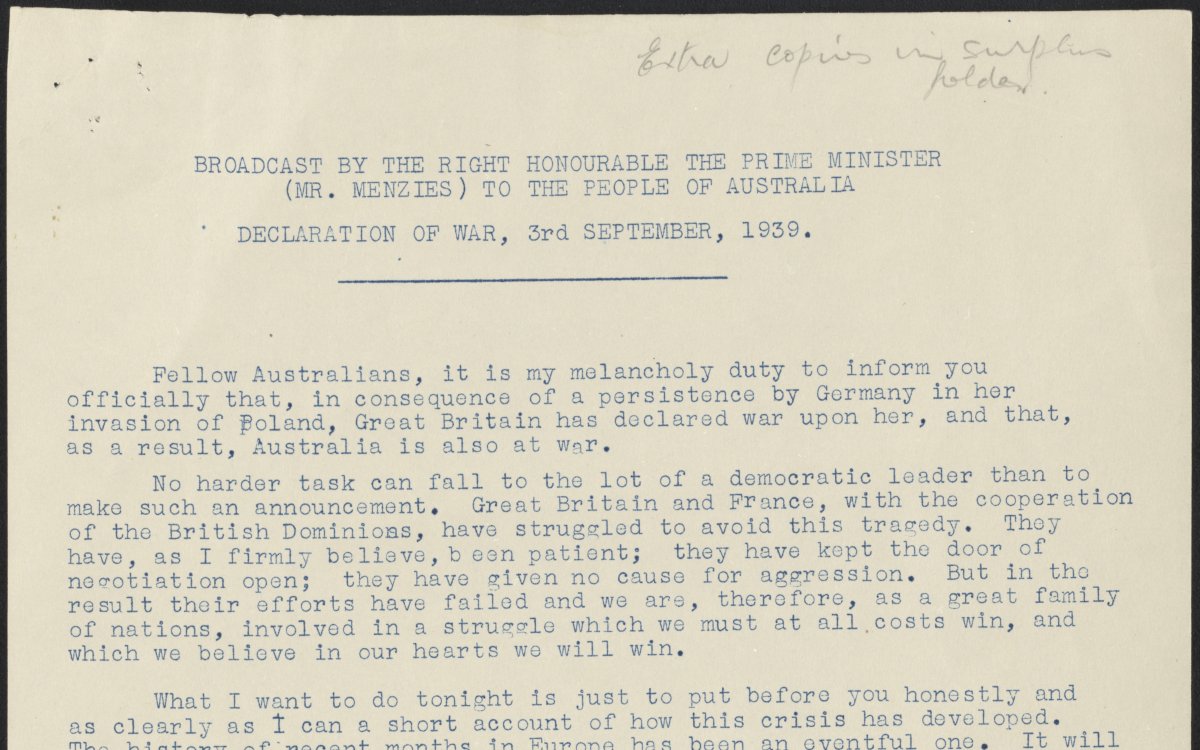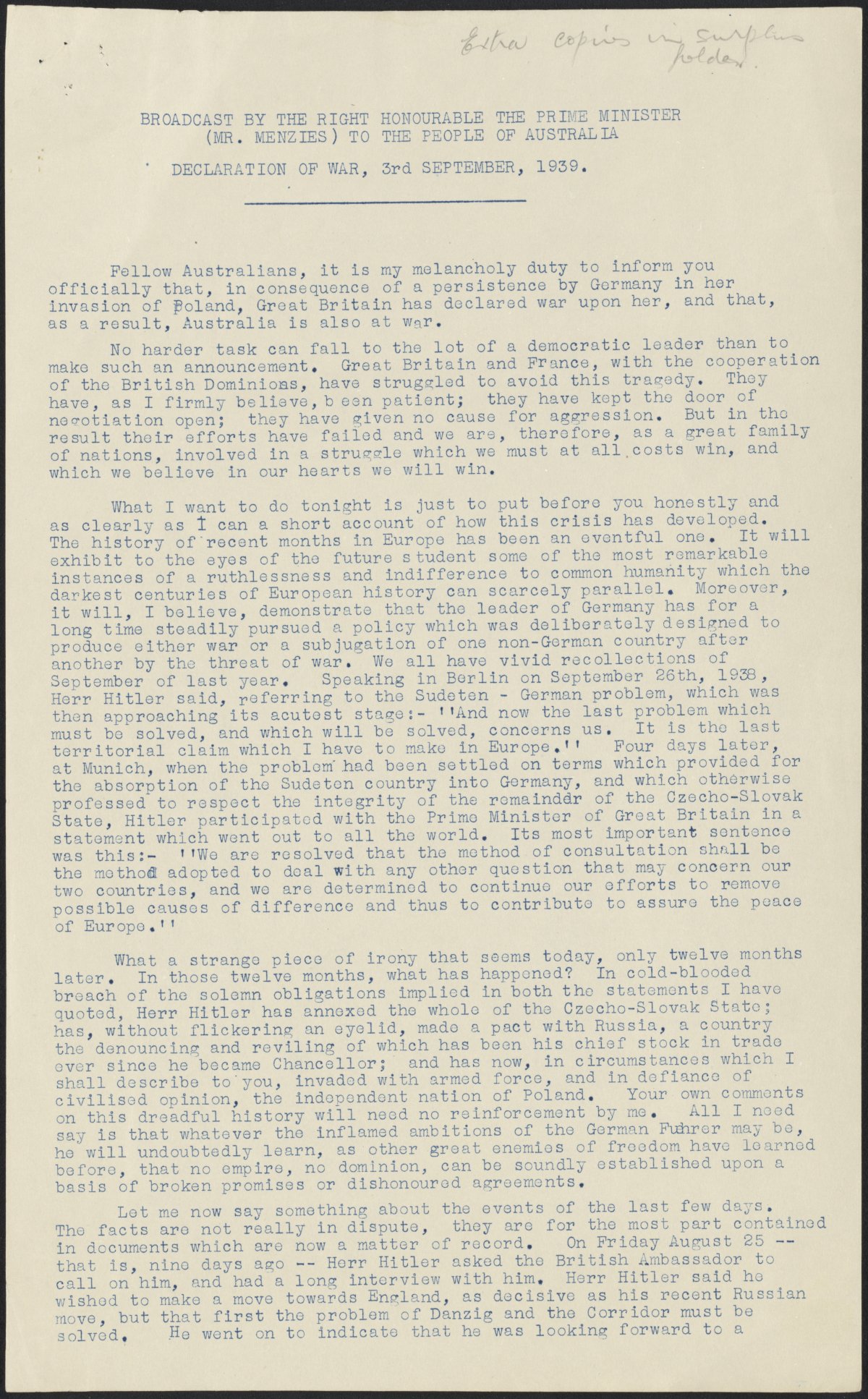
(1939). The Rt. Hon. R.G. Menzies P.M. of Australia broadcasting to the nation the news of the outbreak of war, 1939 [picture]. http://nla.gov.au/nla.obj-136636422

Menzies, Robert, Sir, 1894-1978. (1905). Papers of Sir Robert Menzies, 1905-1978 [manuscript]. https://nla.gov.au/nla.obj-233710278
Prime Minister Menzies’ 1939 radio address
At 9.15 pm on Sunday 3 September 1939, Australia’s Prime Minister, Robert Menzies (1894–1978), gave a radio address, announcing that Australia was at war with Germany:
Fellow Australians, it is my melancholy duty to inform you officially that, in consequence of a persistence by Germany in her invasion of Poland, Great Britain has declared war upon her, and that, as a result, Australia is also at war.
The National Library of Australia holds primary documents relating to the announcement, including a photograph of the prime minister delivering the address, a sound recording of the broadcast, and a typed transcript of it.
In his speech, Menzies explained the two major events that led to Australia’s declaration of war. The first was the invasion of Poland by Germany.
German aggression
In 1933, the National Socialist German Workers’ Party (better known as the Nazi Party) came to power in Germany under its leader, Adolf Hitler. Hitler moved quickly to consolidate power and to eliminate any political opposition.
In the mid- to- late 1930s, following a program of economic reconstruction and militarisation, Nazi Germany began making aggressive demands for territory. On the basis of its historical ties to neighbouring land, and a desire for Lebensraum (living space) for a perceived wider Germanic people, Germany seized both Austria and the Sudetenland (a German-speaking part of Czechoslovakia) in 1938 and 1939.
Much of Germany’s territorial expansion occurred under the terms of the Munich Agreement between the major powers of Europe. This settlement allowed Germany to annex the Sudetenland—the Allies’ unsuccessful attempt to appease Germany.
When it looked like German expansion into Poland might be next, the British and French governments signed an agreement guaranteeing Poland’s sovereignty. The subsequent invasion of Poland by Germany led Britain and France to declare war at around 11 am, London time, on 3 September 1939.
The deepening of the crisis in Europe in the late 1930s meant that when war did come, in September 1939, Australians were not surprised. Menzies’ sober and detailed speech shows the circumstances leading to the outbreak of World War II from the perspective of an Australian government.
In cold-blooded breach of the solemn obligations … Hitler has annexed the whole of the Czechoslovak state; has, without flickering an eyelid, made a pact with Russia … and has now, under circumstances which I will describe to you, invaded with armed force and in defiance of civilised opinion, the independent nation of Poland.
Australian ‘Britishness’
The second event identified by Menzies in his speech as justification for Australia’s declaration of war was Britain’s own declaration of war. Because Australia was a self-governing British dominion at the time, if Britain was at war, Australia was duty-bound to support Britain. Accounting for the time difference between Britain and Australia, Prime Minister Menzies’ declaration of war came just over an hour after Britain’s.
Menzies was a firm believer in the Commonwealth, ‘a great family of nations’ based on common ancestry and allegiance to the Crown. As he stated in his speech:
There can be no doubt that where Great Britain stands, there stand the people of the entire British world.
There had been no Parliamentary debate on the decision to take Australia to war. But while Australians did not like the prospect of fighting another war, there was almost universal support of Menzies’ decision to declare war and for his explanation of its necessity. As Menzies later stated in his memoirs:
My announcement expressed the overwhelming sentiment of the Australian people … in 1939 neutrality for Australia in a British war was unthinkable unless we were prepared to add secession to neutrality.
In the 1930s, Australians seeing themselves as British was not in conflict with a sense of ‘Australianness’. In his radio address, Menzies refers to Britain as the ‘Mother Country’. It is in this sense that Menzies has been described as having a similar attitude to an earlier prime minister, Alfred Deakin, albeit a generation later—as ‘an independent Australian Briton’.
A just war?
In his speech, Menzies put forward arguments to justify why Australia should go to war. He outlined a commitment to an international cause—fighting fascism, German expansion and militarism:
It is plain, indeed it is brutally plain, that the Hitler ambition has been not, as he once said, to unite the German peoples under one rule but to bring under that rule as many European countries, even of alien race, as can be subdued by force.
If such a policy were allowed to go unchecked there could be no security in Europe and there could be no just peace for the world. A halt has been called. Force has had to be resorted to, to check the march of force. Honest dealing, the peaceful adjustment of differences, the rights of independent peoples to live their own lives, the honouring of international obligations and promises, all these things are at stake.
‘No harder task can fall to the lot of a democratic leader’
At the time he gave his famous address, Robert Menzies had been Prime Minister for just over four months. Following the death in office of Joseph Lyons in 1939, Sir Earle Page, leader of the Country Party, had been appointed as a caretaker prime minister while the governing United Australia Party (UAP) chose a new leader. When Menzies, the former Attorney-General and Minister for Industry was voted in narrowly by the UAP party room, Page refused to serve with him (he would have preferred the return of Stanley Bruce to politics and the party leadership). Page resigned and withdrew his Country Party from the coalition and Menzies became prime minister.

Falk Studios (Firm). (1939). Portrait of Sir Earle Page [picture] / The Falk Studios. http://nla.gov.au/nla.obj-136266546
Less than two weeks after his radio address, Menzies formed a War Cabinet. This collection of Government ministers would shape Australia’s decision-making in relation to the conflict.

(1941). Autographed portrait of John Curtin, Prime Minister of Australia, 1941-1945 [picture]. http://nla.gov.au/nla.obj-137128033
When the 1940 election resulted in a hung parliament and a minority UAP government, Menzies suggested a government of national unity to see out the duration of the war. The ALP had decided at a conference before the election that it would not support such a move:, its leader John Curtin suggesting instead an Advisory War Council, where the Government and opposition would have equal representation.
‘What may be before us we do not know, nor how long the journey’
During Menzies’ wartime prime ministership (1939–1941), Australia sent Royal Australian Air Force (RAAF) aircrews and a number of Royal Australian Navy (RAN) ships to fight for Britain. The Australian Army did not engage in combat until 1941, when three divisions joined the fight in the North African and Mediterranean zones of conflict, most famously halting the Wehrmacht (Germany’s armed forces) at Tobruk, in North Africa.

Australia. Army. Australian Imperial Force, 2nd (1939-1946) & Ternes. (1940). Your country needs you! Join the A.I.F. now! [picture] / Ternes. https://nla.gov.au/nla.obj-137975181
Australia became inextricably committed to the war. Posters were an easy way to recruit for the armed forces. This striking Australian recruitment poster features British Prime Minister Winston Churchill. It echoes the famous World War I British recruitment poster, which had so successfully used Lord Kitchener’s steely gaze, his pointing finger and the same words.
Australia became inextricably committed to the war. Posters were an easy way to recruit for the armed forces. This striking Australian recruitment poster features British Prime Minister Winston Churchill. It echoes the famous World War I British recruitment poster, which had so successfully used Lord Kitchener’s steely gaze, his pointing finger and the same words.
Despite the general support for Australian involvement, in the early years the war still seemed distant. People were reluctant to make sacrifices. This was especially the case during the period between the Allied declaration of war in September 1939 and the beginning of major military operations, a time often referred to as the ‘Phoney War’. Menzies had called for a business-as-usual attitude during this period, but in mid-1940, as German troops marched through Belgium, the Netherlands and Luxembourg on their way to Paris, the Prime Minister would have great difficulty shifting the nation’s outlook to that of a ‘total war’ home front.

(1941). Portrait of Prime Ministers R.G. Menzies and Winston Churchill at Downing Street, London, 1941 [picture]. http://nla.gov.au/nla.obj-137388175
In late January 1941, Menzies left for London. Spending around four months overseas, he attended British Prime Minister Winston Churchill’s War Cabinet, sought British reinforcements for Singapore, and toured the United States, lobbying Washington for intervention in the conflict. Menzies was criticised for spending so much of 1941 abroad. Some even though he harboured ambitions to be the next British Prime Minister after Churchill. He returned home to find he had lost the support of his own party and was forced to resign. The independents who had made up the numbers for the UAP minority government withdrew their support and Labor leader John Curtin assumed the prime ministership.
Activities
Ask students about the nature of Australia’s relationship with Britain that led it to follow Britain into war.
Menzies famously described himself as ‘British to my boot heels’. Have students investigate Menzies’ heritage. Ask them whether there was a perceived conflict between being ‘British’ and being ‘Australian’ at the time.
Divide the class into groups and have them discuss the concept of ‘a ‘just war’. Ask them to investigate ‘just war theory’ as presented by Cicero and Thomas Aquinas.
Next, have the groups consider the following questions:
• Do you agree that a ‘just war’ can exist?
• Was World War II ‘just’?
• Does it differ from subsequent conflicts in this sense?
• Would you have enlisted to fight the Nazis in World War II? What about Vietnam? Iraq? Afghanistan?
Ask students to imagine they are speechwriters for a head of government in September 1939. They have been asked to draft an address to the nation, following the declaration of war against Nazi Germany. Ask them what types of words they would use and what the tone of the speech would be. Ask them how and why their speeches would be different from Menzies’ speech.
Ask students to write a short speech and swap it with a classmate, who will then deliver it.





